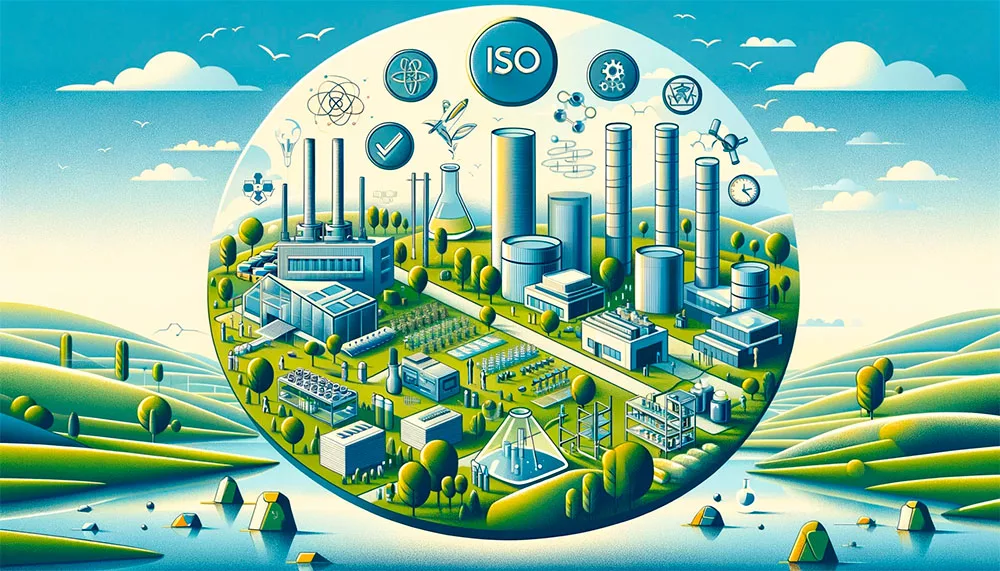ISO Standards in Pharma
International Organization for Standardization

David Blok | Posted on December 11, 2023
Introduction
What is ISO in Pharma
Welcome to our in-depth exploration of ISO standards in the pharmaceutical industry. In this article, we will uncover the pivotal role that the International Organization for Standardization (ISO) plays in ensuring the quality and safety of pharmaceutical products. Navigating the complexities of ISO can be challenging, but it’s crucial in an industry where precision, safety, and compliance are non-negotiable. Whether you’re a seasoned professional or new to the field, this guide will illuminate the significance of ISO in pharma, providing insights into how it shapes the industry’s landscape.
ISO’s Role in Pharma
The Significance of ISO Standards in Pharmaceuticals
In the pharmaceutical world, ISO standards touch every aspect of production, from research and development to manufacturing and distribution. They provide a framework for quality management systems, environmental management, risk assessment, and laboratory testing. By adhering to ISO standards, pharma companies demonstrate their commitment to quality, safety, and efficacy, which is essential in a field where the stakes are life-saving.
Key ISO Standards for Pharma
Overview of Essential ISO Standards Relevant to the Pharma Industry
Several ISO standards are particularly relevant to the pharmaceutical industry. ISO 9001, the standard for quality management systems, is foundational. ISO 14001 focuses on environmental management, crucial for sustainable production practices. ISO 17025 covers the general requirements for the competence of testing and calibration laboratories, which is vital for drug development and quality control.
Benefits of ISO Compliance
How Adhering to ISO Standards Benefits Pharma Companies
Complying with ISO standards brings numerous benefits to pharmaceutical companies. It enhances product quality and reliability, ensures regulatory compliance, and boosts customer confidence. Additionally, it streamlines processes, reduces waste, and can lead to operational efficiencies. ISO compliance is not just about meeting standards; it’s about striving for excellence in every aspect of pharmaceutical production and delivery.

Make Smarter API Decisions with Data
Access exclusive insights on global API pricing, export/import transactions, competitor activities and market intelligence.

ISO Certification Process
Detailed Steps Involved in Obtaining ISO Certification
Obtaining ISO certification involves a multi-step process. It starts with understanding the relevant ISO standards and integrating them into the company’s processes. This is followed by internal auditing to ensure compliance, and then by selecting a reputable external certification body. The certification process includes a thorough review of company procedures, documentation, and practices, culminating in an external audit.
ISO vs GMP
Comparing ISO Standards with Good Manufacturing Practices
While ISO standards are broad and cover various aspects of quality and safety, Good Manufacturing Practices (GMP) are specific to the pharmaceutical industry. GMP guidelines, enforced by regulatory bodies like the FDA, are focused on ensuring that products are consistently produced and controlled according to quality standards. ISO complements GMP by providing a framework for consistent quality management systems, making them both essential for pharma companies.
Common Challenges
Discussing Common Challenges in Achieving ISO Compliance
Achieving ISO compliance can be challenging for pharmaceutical companies, particularly in areas like documentation, process standardization, and staff training. Keeping up with the evolving standards and integrating them into existing systems requires dedicated resources and continuous improvement. Additionally, smaller companies might find the cost and effort of certification daunting, although the long-term benefits often outweigh these initial hurdles.
Addressing Non-Compliance
How to Handle and Rectify Non-Compliance Issues
Addressing non-compliance starts with identifying the gaps through internal audits and reviews. Once these gaps are identified, companies need to develop a corrective action plan, which may involve process changes, staff training, or system upgrades. Regular monitoring and continuous improvement are key to maintaining compliance and adapting to any changes in ISO standards or industry requirements.
Future of ISO in Pharma
Predictions and Trends Related to ISO Standards in the Pharma Industry
The future of ISO in the pharmaceutical industry is likely to see an increased emphasis on digitalization and data security, given the growing role of technology in healthcare. Standards like ISO 27001 for information security management are becoming increasingly relevant. Furthermore, sustainability and environmental impact are areas where ISO standards could expand, reflecting the industry’s growing commitment to eco-friendly practices.
Global Impact
Exploring the Worldwide Influence of ISO Standards in Pharma
ISO standards have a profound global impact on the pharmaceutical industry. They facilitate international trade by providing a common set of guidelines recognized across borders. This harmonization is crucial for multinational companies and plays a significant role in ensuring access to quality medicines worldwide, especially in countries with less stringent national regulations.
Conclusion
Summarizing the Key Points and the Importance of ISO Standards
In conclusion, ISO standards play a critical role in the pharmaceutical industry, guiding companies towards excellence in quality, safety, and efficiency. While navigating these standards can be complex, the benefits of ISO compliance—enhanced credibility, improved processes, and global market access—are invaluable. As the industry evolves, staying abreast of ISO standards will remain crucial for pharmaceutical companies committed to excellence and innovation.
How does ISO certification impact a pharmaceutical company's global reach?
ISO certification enhances a company's credibility on a global scale, making it easier to enter international markets. It signifies compliance with universally recognized standards, which is often a prerequisite for international trade.
Can a company be ISO certified and still not comply with GMP?
Yes, it's possible. ISO certification focuses on broad quality management systems, while GMP is specific to the pharmaceutical industry's production and quality control. Both are important, and companies should strive for compliance with both sets of standards.
How often are ISO standards updated, and how do companies keep up?
ISO standards are reviewed every five years to ensure they remain relevant. Companies keep up by regularly reviewing changes, training staff, and updating their processes and systems as needed.
Is ISO certification mandatory for pharmaceutical companies?
While not legally mandatory, ISO certification is often considered essential for credibility, quality assurance, and market access. Some regulatory bodies and clients may require it.
What is the most challenging part of maintaining ISO certification for pharma companies?
The most challenging part is often ensuring continuous improvement and adapting to changes in standards and industry practices. It requires ongoing commitment, resources, and a culture of quality.









Check out all other blogs here!